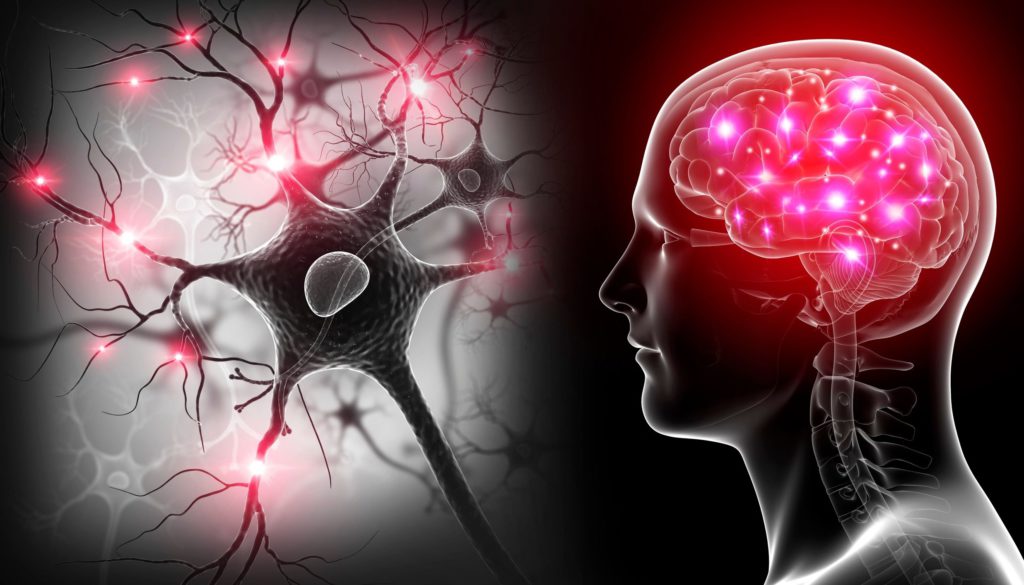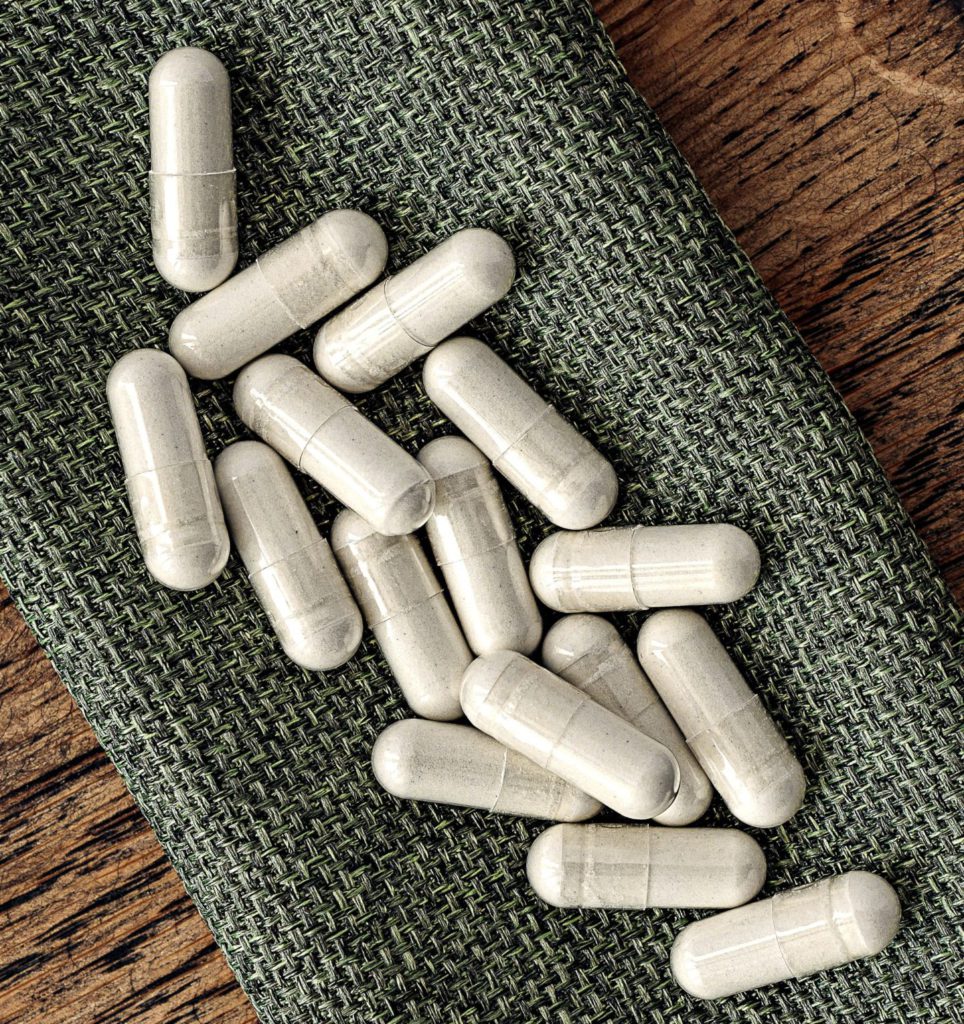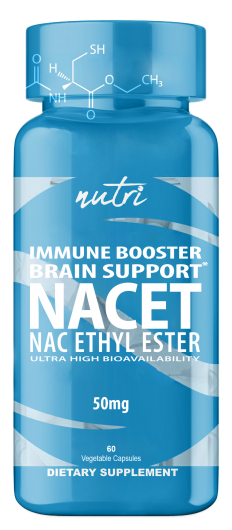
What is NACET?
NACET (N-Acetyl L-Cysteine Ethyl Ester) is similar to NAC (N-Acetyl L-Cysteine) only much better! You’ve probably heard of NAC because it is the precursor to the powerful antioxidant glutathione. NAC is also used in hospitals to treat acetaminophen overdose.*
However, NACET is totally different from traditional NAC. NACET is the esterified version of NAC that has gone through a change in order to create the more absorbable and less recognizable NACET. Not only is the ethyl ester version much more bioavailable than NAC, but it is also able to sneak past the liver and kidneys and cross the blood brain barrier. In addition, NACET has the unique ability to protect against oxidative damage while being transported to the entire body via the red blood cells.
NACET, once in the cell, is transformed into NAC, cysteine, and ultimately glutathione. Then the antioxidant glutathione helps to detoxify and regulate proper immune function, help with cellular repair and supports antiaging and cognitive functioning.*
NACET - 1,000% Better than NAC
NAC only has an absorbability of about 6%, while NACET has a much higher bioavailability of 70-80%+. NACET is able to accomplish this because of its lipophilic properties. Being lipophilic means that the NACET is oil/fat and water soluble. This allows NACET to cross blood barriers and be absorbed by red blood cells to penetrate all organs and cells. This makes NACET far superior to NAC .*
Another efficient property of NACET is its ability to bypass the stomach and not be absorbed in the gut. Your body recognizes the value of the cysteine in NAC and snatches it up in the stomach, liver or kidneys–hoarding the cysteine in epithelial cells (cells lining body cavities and hollow organs) instead of allowing it access to the brain and other desired areas! With the extra ethyl ester, NACET is unidentifiable as NAC, allowing it to move to every nick and cranny of the body to its desired end point via the blood stream*
What's So Great About Glutathione?
Glutathione is key for building and repairing tissues. As a powerful antioxidant, glutathione prevents oxidative damage and supports optimal cellular health for the brain, heart, lungs, and all other organs and tissues. Just like the browning of an apple exposed to air, oxygen exposure to individual cells starts the breakdown process. This is why antioxidants are so popular, they protect your cells from deterioration due to oxidative damage.*
Your body naturally converts cysteine into glutathione, but your body has a limited supply and typically runs out. This is why NACET is such an effective supplement, it supplies your body with more cysteine so that it can make antioxidants like glutathione!
What Makes nutrí NACET Even Better?
In our nutrí NACET, we’ve combined NACET with Selenium, Molybdenum, and Glycine for increased absorption, cellular transport, and glutathione synthesis.* Not sure what any of those are or do? Don’t worry! We will explain.
Selenium
Selenium plays an important role in cellular activity and glutathione production. It enhances T-cells and white blood cells. Selenium has also been found to support thyroid health, cognitive function, immune health, and free radical protection. It is categorized as an essential trace mineral, something that our body needs but doesn’t produce naturally. Selenium can be found in soil, water, and some foods. But we want to save you the hassle of digging to find it and just put it in our NACET.*
Molybdenum
Molybdenum works in the body to break down proteins that certain enzymes use to break down toxins. Molybdenum is also an essential trace mineral that your body does not produce naturally.*
Glycine
Your body produces and uses glycine, an amino acid, to create proteins for tissue maintenance, hormone creation, and making enzymes. Glycine is also one of only three amino acids used in producing glutathione. Glutathione is a powerful antioxidant that protects your cells from free radical and the oxidative damage that they can cause. When your glycine levels are low, less glutathione is produced, and your body is exposed to oxidative stress without adequate protection. Glutathione levels decrease with age, so as you grow, it’s important to ensure that you get enough glycine.*
NACET FAQs
Can I take NACET more than once daily? ▼
Yes, the recommended dosage for NACET is 50-100 mg per day. Due to its high absorbability, 50mg of NACET is equivalent to over 660 mg of NAC. It can be taken up to three times daily but once a day is sufficient.
Since NACET is considered a nootropic, will it give me the jitters or raise my blood pressure? ▼
Nootropics can increase cognitive performance and memory. NACET works on the brain by improving its natural performance rather that artificially enhancing performance. It is very safe without any side effects. It does not increase blood pressure or give you the jitters. *
Why is NACET better than NAC? ▼
NACET is 1000 times more absorbable than NAC and more bioavailable. NAC is only 6% bioavailable. NACET is both fat and water soluble and, unlike NAC, it crosses the blood brain barrier making it more beneficial for healthy brain function and cellular health.*
What happens to the Ethyl Ester in the body once it turns into NAC and then to Glutathione? ▼
It is broken down by the cell and converted to ethanol then transported out of the body through the circulatory system.
Is NACET an antioxidant? ▼
NACET is a potent scavenger of harmful free radicals. It is a precursor to glutathione which is a powerful antioxidant responsible for tissue building and repair, making chemicals and proteins needed in the body, detoxification, brain and eye health, and healthy immune system function.*
Why is there Selenium, Molybdenum and Glycine combined with NACET? ▼
These beneficial nutrients enhance the transport of NACET and help with the production of glutathione.
Does NACET have side effects? ▼
No side effects have been recorded or shown with toxicity and double-blind placebo studies.
Why does NACET have such a strange smell? ▼
NACET is a precursor to the most important antioxidant, glutathione, and contains a sulfer group. Sulfer scavenges free radicals and is required for the sythesis of glutathione. This is why NACET has such a stong sulfer smell.
Who shouldn’t take NACET? ▼
NACET and NAC may slow blood clotting. Consult with your doctor if you are on blood thinning medication.*
Related Supplement Articles

Supplement Spotlight – Sea Moss
Kim Kardashian made a splash when she divulged that one of her secret health ingredients was sea moss. With the advent of the new year, celebrities

Supplement Spotlight – NAC
If you have never heard of NAC or N-Acetylcysteine, you aren’t alone. Many people have never heard of it, and yet, it is a wonderful

Supplement Spotlight – Cranberry Gummies
Cranberries! Despite their tartness, these shiny, ruby-red fruits are an icon around the holidays. Staples at most families Thanksgiving feasts, cranberries are also used to
* These statements have not been approved by the FDA. These products are not intended to diagnose, treat, cure, or prevent any disease.


